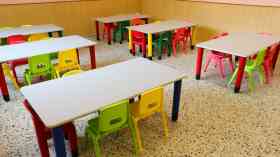Reimagining the university experience
 The facilities management (FM) team at Edge Hill University were awarded the ‘In‑House Team of the Year’ Award at the British Institute of Facilities Management (BIFM) Awards in October 2013, flying the flag for FM in education sector. So what set the university apart from the competition?
The facilities management (FM) team at Edge Hill University were awarded the ‘In‑House Team of the Year’ Award at the British Institute of Facilities Management (BIFM) Awards in October 2013, flying the flag for FM in education sector. So what set the university apart from the competition?
The professional in-house facilities management team at Edge Hill University comprises almost 300 permanent members of staff, funded by the university and operating within the context of an extremely competitive and financially challenging higher education sector.
Commitment to a vision
Speaking on the Edge Hill entry and their win, ‘In House Team of the Year’ lead judge Paula Stevenson commented that “the commitment to the vision strategy and executives of the university was outstanding, making Edge Hill a worthy winner.
She said: “The team are fully engaged in delivering excellent customer service, understanding their customers fully and looking for ways to deliver great service in an area that has to redefine its place in what is now a very competitive industry. They clearly showed their understanding of the business and were focussed on delivery. Part of the strategy was to recruit FM professionals into the business to support the vision to deliver a hotel style service which aligned to the overall university vision. The team provided evidence of successes in cost management, property strategy, talent management and service delivery. The commercial and business acumen was clearly evident throughout the submission.”
Moving up the rankings
By electing to treat students as customers and adopting a commercial market approach to customer service, Edge Hill University’s in-house FM team not only saw the institution leap nine places on the higher education rankings table within a year – from 95th place to 84th – but also made a number of cost savings.
Taking the initiative to map the ‘student journey’ through the university life cycle, the team identified how FM services impact every stage of that journey – and how to ensure that impact is positive. This was integral to Edge Hill’s success, as facilities and services are of course an enormous part of a university’s product offer.
One example is that on Welcome Sunday each September – when students first move into their halls of residence – the FM team provides a golf buggy and trailer shuttle service to help students whose accommodation is not close to parking.
As well as being helpful, generating appreciative feedback from students and families, the ‘fun factor’ of this scheme gives what the team call a ‘buzz’ to the proceedings, making it a memorable and enjoyable experience, too.
Making savings
Competitive costs were also achieved through improving FM services. Among these reforms were LED lighting replacement and lighting control schemes across campus, which produced annual energy savings of £66,000, and a campaign to reduce energy waste over Christmas 2012, resulting in a 5.3 per cent reduction in usage compared to 2011.
For the team at Edge Hill, their efforts have proved that FM succeeds through customer care. And in a sector where government funding can be lost if student recruitment targets are not hit or students drop out of courses, satisfying the customer is all-important.
Integrated service areas
The team deliver a comprehensive range of services across six integrated service areas: Business support (including healthcare and financial control); campus support (which deals with things like emergency response and CCTV; catering; customer service; housekeeping; and property services (covering issues like maintenance, space planning and energy management).
Students as customers
A key to the success of the FM operation is the fact that the FM team view their students as customers. A Centre for Assessment Ltd report from November 2012 highlighted this, stating “(FM) staff were keen to show their determination to go above and beyond expectations of customers. A positive approach and a genuine interest in their customers showed a passion to deliver what they have promised. It was clear that all staff are committed and motivated to promote the best service possible through a customer focussed approach.”
In many quarters of the HE Sector, opinion remains polarised as to whether students should be viewed as customers or ‘consumers’.
However, at Edge Hill University, the facilities management team is in no doubt. Students are their ‘life blood’ and they recognise them as customers, working tirelessly to understand their needs, the reasons that underpin their final choice of university and their expectations of university life.
Connecting with students
Edge Hill University recognise that, whilst university reputation and quality/availability of academic degree course will undoubtedly be at the forefront of student choice at the application stage, converting ‘conditional offers’ into actual places taken up can rely significantly upon the whole product offer.
The campus and the underpinning facilities and services provided by FM at Edge Hill University form an intrinsic part of this total offer.
The student’s emotional connection with the university is often formed within minutes of arrival at open days and applicant visit events, as they experience the welcoming, attractive and safe environment. This view is consistent with student feedback at a local level, and with the broad themes identified in national research, including the Sodexo University Lifestyle Survey.
Further information
www.edgehill.ac.uk
Latest News
17/12/2025 - 09:31
Ofqual has fined exam board Pearson more than £2 million in total for serious breaches in three separate cases between 2019 and 2023 which collectively affected tens of thousands of students.
16/12/2025 - 09:19
The average funding rates will increase by 4.3% for under 2s, and by almost 5% for 3-and-4-year-olds.
15/12/2025 - 10:30
Local colleges are set to receive £570 million in government funding to expand training facilities in areas such as construction and engineering.
12/12/2025 - 11:39
The government has announced at least £3 billion to create tens of thousands of new specialist SEND places in mainstream schools.
12/12/2025 - 07:07
The findings suggest that children and young people attending schools in the North of England are less likely to take part in and benefit from residential visits.







